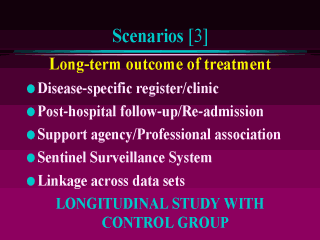| front |1 |2 |3 |4 |5 |6 |7 |8 |9 |10 |11 |12 |13 |14 |15 |16 |17 |18 |review |
 |
Scenario 3:
As a hospital researcher, you want to find out the long term outcome of a particular
treatment. Where do you find the patients and how do you document the outcomes? The obvious thing would be to identify diagnosed patients from a disease register (if they exist) and subsequently contact patients with the doctors consent. Alternatively, go to a specialist clinic and interview patients there after you obtain ethics approval. You could also find out about patients who have been discharged and later contact them to follow-up on your topic and/or examine their records on re-admission. However, this is often not possible unless you have the cooperation of hospital staff and patient consent. Some cities have an established support group (e.g. Multiple Sclerosis Society) of a professional body (Diabetes Health Professionals) directly treating the patient and having access to their clinical records. These two sources could also be investigated. Less comprehensive databases but containing information not available in hospitals are doctors based sentinel systems. Again, these will cover a range of less severe cases who may well have very different long-term outcomes. If all human contact fails and you obtain ethics approval, you can consider linking hospital or doctors data with hospital admissions, or mortality, cancer or other disease registers (postulated to be long-term outcomes of the treatment under study). IN A PERFECT WORLD OF ENDLESS MONEY AND UNEXPOSED PATIENTS, A LONGITUDINAL STUDY WITH A CONTROL GROUP WOULD BE THE BEST OPTION. |